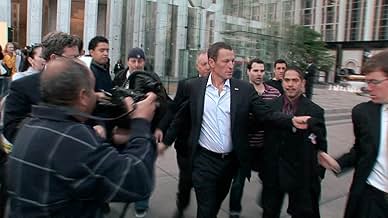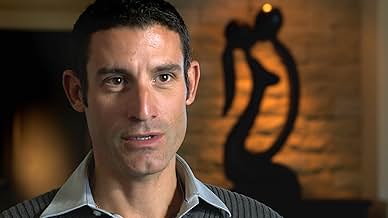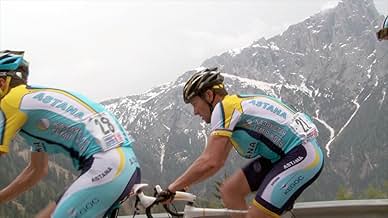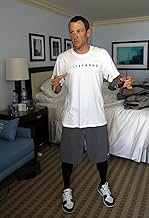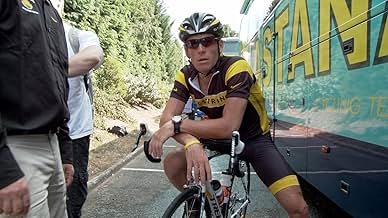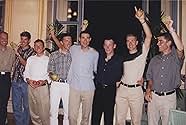VALUTAZIONE IMDb
7,2/10
8220
LA TUA VALUTAZIONE
Aggiungi una trama nella tua linguaA documentary chronicling sports legend Lance Armstrong's improbable rise and ultimate fall from grace.A documentary chronicling sports legend Lance Armstrong's improbable rise and ultimate fall from grace.A documentary chronicling sports legend Lance Armstrong's improbable rise and ultimate fall from grace.
- Regia
- Sceneggiatura
- Star
- Nominato ai 1 BAFTA Award
- 2 vittorie e 8 candidature totali
Michael Bloomberg
- Self - NYC Mayor
- (filmato d'archivio)
Bill Clinton Jr.
- Self - Former US President
- (filmato d'archivio)
Anderson Cooper
- Self - Interviewer
- (filmato d'archivio)
Sheryl Crow
- Self - Lance's Girlfriend
- (filmato d'archivio)
Tyler Hamilton
- Self - Teammate
- (filmato d'archivio)
Recensioni in evidenza
I always admire the commitment of a documentarian. It feels destined for Alex Gibney to have been following Lance Armstrong just before the turn of his downfall as all his documentaries need a tinge of controversy before they're just right. A comeback film wouldn't have been as interesting as this. Perhaps it's morbid curiosity of why I'm looking into Lance Armstrong more now that the truth has broken out than when he was heroic cyclist who wasn't held back by a little cancer. What brings a man to do something like this? What was the point? The Armstrong Lie has intimate access to the disgraced icon and it's undeniable that he's compelling to watch, if sometimes repulsive. Above all, it reveals the nature of our celebrity worship culture and the power it feeds and the lives it destroys.
The documentary covers all aspects of the sport of cycling. It's quite infectious with its cinematic style and I regret watching this the day that the Tour de France was close to me but I missed it. The film gives scattered information about the basics but there's great insight into how the cheating works. The cutting makes the human drama thrilling as people try to beat Armstrong at his game. The film doesn't necessarily take a side, but he still makes you sick to your stomach when he lies through his teeth to the camera. I couldn't help but keep thinking that Ben Foster will be perfect for Stephen Frears' upcoming film. We still haven't got all the facts, especially about Armstrong's peers, and there's quite a bit about media manipulation here too which the film is a part of, but the story of a contemporary legend falling touches an aching nerve.
8/10
The documentary covers all aspects of the sport of cycling. It's quite infectious with its cinematic style and I regret watching this the day that the Tour de France was close to me but I missed it. The film gives scattered information about the basics but there's great insight into how the cheating works. The cutting makes the human drama thrilling as people try to beat Armstrong at his game. The film doesn't necessarily take a side, but he still makes you sick to your stomach when he lies through his teeth to the camera. I couldn't help but keep thinking that Ben Foster will be perfect for Stephen Frears' upcoming film. We still haven't got all the facts, especially about Armstrong's peers, and there's quite a bit about media manipulation here too which the film is a part of, but the story of a contemporary legend falling touches an aching nerve.
8/10
The Armstrong Lie is a documentary that takes a deep look at one of the most horrendous best kept lies of the sports history, the rise and fall of Lance Armstrong after being disgracefully accused for doping. He was once known as the greatest cyclist the world has ever seeing who won 7 Tour De France titles from 1999-2005 after battling and recovering from cancer.
After winning 7 titles and being away for 4 years in retirement Armstrong makes a surprise come back in 2009 with hopes of winning another title and raising funds for cancer patients. The director of this documentary Alex Gibney was hired to make a documentary of the comeback of Armstrong and he has being covering Armstrong's sports history for quite some time. But as the doping scandal came to light the original project was never finished. But in 2013 Gibney decided that he needs a proper ending to his documentary and re-opened it after Armstrong makes a confession on Oprah Winfrey show.
This documentary is quite easy and interesting to follow. For someone with even a mild knowledge about professional cycling and Armstrong it can be digested without much effort. While having a deep look at Armstrong's sporting career and the doping dilemma the documentary effectively provides important background information about the sport itself that fuels the main plot. And it manages to tell the story from several perspectives than being biased in to one point of view, the intention being the viewer to have their own conclusion of what had really happened. There ample amount of historical footage of practice runs, races, press conferences, court trials and other video that builds a strong case relating to each other. Obviously for being someone like Armstrong most of his well-known part of his entire life is on film somewhere. The challenge which the director goes through is to filter the most relevant and create a flow that doesn't over hype or dull to the viewer. In my opinion the job was well done.
The Armstrong Lie is a powerful piece of documentary film making. And it would give you new perspective of what really went on with Lance Armstrong. Maybe you have followed his case eagerly while it was hot but now since things have gone a bit cold a relook would be ideal. Just as Armstrong phrase many times it felt OK at the time.
After winning 7 titles and being away for 4 years in retirement Armstrong makes a surprise come back in 2009 with hopes of winning another title and raising funds for cancer patients. The director of this documentary Alex Gibney was hired to make a documentary of the comeback of Armstrong and he has being covering Armstrong's sports history for quite some time. But as the doping scandal came to light the original project was never finished. But in 2013 Gibney decided that he needs a proper ending to his documentary and re-opened it after Armstrong makes a confession on Oprah Winfrey show.
This documentary is quite easy and interesting to follow. For someone with even a mild knowledge about professional cycling and Armstrong it can be digested without much effort. While having a deep look at Armstrong's sporting career and the doping dilemma the documentary effectively provides important background information about the sport itself that fuels the main plot. And it manages to tell the story from several perspectives than being biased in to one point of view, the intention being the viewer to have their own conclusion of what had really happened. There ample amount of historical footage of practice runs, races, press conferences, court trials and other video that builds a strong case relating to each other. Obviously for being someone like Armstrong most of his well-known part of his entire life is on film somewhere. The challenge which the director goes through is to filter the most relevant and create a flow that doesn't over hype or dull to the viewer. In my opinion the job was well done.
The Armstrong Lie is a powerful piece of documentary film making. And it would give you new perspective of what really went on with Lance Armstrong. Maybe you have followed his case eagerly while it was hot but now since things have gone a bit cold a relook would be ideal. Just as Armstrong phrase many times it felt OK at the time.
To judge something in terms of how it's executed is all well and good but in a documentary such as this the message takes precedence. It seeks the truth and all the arguments aren't displayed for that to emerge. If it it simply allowed the viewer to make up his own mind then that would be o.k but the film displays a bias thereby becoming a vehicle and a misleading one at that.
The fact that doping was prevalent in cycling and still plays a large factor is obvious. If Armstrong was racing on a level playing field of dopers then that to me would also have been acceptable. However this was far from the case.
Non of Lance's team mates were caught doping whilst they were in his team. Meanwhile all his major competitors were absent from the start line at various points in time due to suspensions and had some key teammates missing from every tour for the same reason. Throughout all the disruptions, devastation, controversy and even a suicide Armstrong was always there with a full strength squad.
The film touches on the importance of team mates and how on all of his wins Armstrong rode alone for only minutes at a time, but fails to take the next step and look at how the various disqualifications imposed on all other teams (apart from his own during his winning years) affected his competitors. Had the film done this Armstrong would never have agreed to be in it because he's still pushing the lie that he won those seven Tours fair and square once we accept as fact that they were all doping.
The UCI had invested in him and were being invested in by a lot of the same sponsors, they allowed many cyclists to burn whilst protecting this man. The film doesn't touch on those aspects and the film maker remains a fan.
I gave the film five stars because it is well shot and well put together. I am a cycling fan and it's view of the race was a pleasure to watch. There is stock footage obviously but the film does follow Armstrong and films the 2009 race independently. The film gives an insight into what it takes to be a professional rider and rider's relationships with one another and their team officials.
Some of the people interviewed I've never seen interviewed i.e doctor Ferrari, which added another point of interest for me.
The 2009 and other pre-'outed' interviews were interesting, giving an insight into Armstrong's mentality at the time and although there is marked contrast to his post-confessional ones it's by no means a transformation and a true repentance. His approach to people seems outwardly very different now, but his attitude towards his legacy and the morality of his actions remain to all intents and purposes unchanged. The exclusions of Paul Kimmage and Greg Lemond from the documentary also indicate this.
I'd say watch the film but bear the other stuff in mind too.
The fact that doping was prevalent in cycling and still plays a large factor is obvious. If Armstrong was racing on a level playing field of dopers then that to me would also have been acceptable. However this was far from the case.
Non of Lance's team mates were caught doping whilst they were in his team. Meanwhile all his major competitors were absent from the start line at various points in time due to suspensions and had some key teammates missing from every tour for the same reason. Throughout all the disruptions, devastation, controversy and even a suicide Armstrong was always there with a full strength squad.
The film touches on the importance of team mates and how on all of his wins Armstrong rode alone for only minutes at a time, but fails to take the next step and look at how the various disqualifications imposed on all other teams (apart from his own during his winning years) affected his competitors. Had the film done this Armstrong would never have agreed to be in it because he's still pushing the lie that he won those seven Tours fair and square once we accept as fact that they were all doping.
The UCI had invested in him and were being invested in by a lot of the same sponsors, they allowed many cyclists to burn whilst protecting this man. The film doesn't touch on those aspects and the film maker remains a fan.
I gave the film five stars because it is well shot and well put together. I am a cycling fan and it's view of the race was a pleasure to watch. There is stock footage obviously but the film does follow Armstrong and films the 2009 race independently. The film gives an insight into what it takes to be a professional rider and rider's relationships with one another and their team officials.
Some of the people interviewed I've never seen interviewed i.e doctor Ferrari, which added another point of interest for me.
The 2009 and other pre-'outed' interviews were interesting, giving an insight into Armstrong's mentality at the time and although there is marked contrast to his post-confessional ones it's by no means a transformation and a true repentance. His approach to people seems outwardly very different now, but his attitude towards his legacy and the morality of his actions remain to all intents and purposes unchanged. The exclusions of Paul Kimmage and Greg Lemond from the documentary also indicate this.
I'd say watch the film but bear the other stuff in mind too.
Many were shocked when Lance Armstrong (finally) admitted to his use of steroids, which assisted in his 7 Tour Du France wins. Stripped of his titles, dumped by his multi-million dollar sponsorships, banned from all World Anti-Doping Agency governed sports, and literally taken out of the record books for all 7 years he won, most expected him to experience a deep shame and regret over his actions. Most of us, upon revealing our deepest secrets, and the lies that we chose to live, might respond in that way, but Lance Armstrong is a different kind of person, and perhaps doesn't function in the same capacity.
Oscar winning documentary film maker Alex Gibney tackles another societal dysfunction, in his attempt to tell the story of why one of sporting world's most famous names, would come out to admit his fraud to the world. It's an absolutely spellbinding story, and doesn't tip-toe around the subject. Rather, it opens up at his most publicly shameful moments, when he told Oprah Winfrey on national television (in yes / no fashion) that he had been cheating the whole time he was winning one of the most grueling competitions in the world. But there is a great deal more to this story, and Gibney delves into some of the bigger problems surrounding the sport, his issues with bullying team mates, the nature of cheating, and most importantly: Why Armstrong acts the way he does.
The American Psychiatric Association defines the narcissistic personality as:
"In which a person is excessively preoccupied with personal adequacy, power, prestige and/or vanity, mentally unable to see the destructive damage they are causing to themselves and often others."
Whenever I think of this personality, a few names come to mind (Donald Trump, and Kanye West are just a few), but I think Lance Armstrong fits this description well. I don't particularly think that he, and others who share these traits, are necessarily terrible people, but it does make them capable of some truly awful actions. It's a remarkable study into this type of personality. Armstrong admits to wrong-doings, but never feels remorse for his actions. It's remarkable how he treats his own teammates throughout his career, and forces us to see him as a very driven man, yet at the same time, one capable of very criminal action.
At this time, in 2016, Armstrong faces a 100 million dollar lawsuit brought forth by the federal government for defrauding the U.S. Postal service (the main sponsor during his tours). It's expected to ruin him financially, but many don't expect a decision requiring a full penalty. Perhaps his actions do have consequences, but he's apt not to let that bother him. That being said, Alex Gibney narrates and describes the situation facing him and sport of cycling rather well. I would recommend this documentary to anyone who was interested in Armstrong as a competitor, but also to really let the depth of his actions sink in with the viewer.
One of Gibney's best, and more personal documentaries.
8/10
Oscar winning documentary film maker Alex Gibney tackles another societal dysfunction, in his attempt to tell the story of why one of sporting world's most famous names, would come out to admit his fraud to the world. It's an absolutely spellbinding story, and doesn't tip-toe around the subject. Rather, it opens up at his most publicly shameful moments, when he told Oprah Winfrey on national television (in yes / no fashion) that he had been cheating the whole time he was winning one of the most grueling competitions in the world. But there is a great deal more to this story, and Gibney delves into some of the bigger problems surrounding the sport, his issues with bullying team mates, the nature of cheating, and most importantly: Why Armstrong acts the way he does.
The American Psychiatric Association defines the narcissistic personality as:
"In which a person is excessively preoccupied with personal adequacy, power, prestige and/or vanity, mentally unable to see the destructive damage they are causing to themselves and often others."
Whenever I think of this personality, a few names come to mind (Donald Trump, and Kanye West are just a few), but I think Lance Armstrong fits this description well. I don't particularly think that he, and others who share these traits, are necessarily terrible people, but it does make them capable of some truly awful actions. It's a remarkable study into this type of personality. Armstrong admits to wrong-doings, but never feels remorse for his actions. It's remarkable how he treats his own teammates throughout his career, and forces us to see him as a very driven man, yet at the same time, one capable of very criminal action.
At this time, in 2016, Armstrong faces a 100 million dollar lawsuit brought forth by the federal government for defrauding the U.S. Postal service (the main sponsor during his tours). It's expected to ruin him financially, but many don't expect a decision requiring a full penalty. Perhaps his actions do have consequences, but he's apt not to let that bother him. That being said, Alex Gibney narrates and describes the situation facing him and sport of cycling rather well. I would recommend this documentary to anyone who was interested in Armstrong as a competitor, but also to really let the depth of his actions sink in with the viewer.
One of Gibney's best, and more personal documentaries.
8/10
THE ARMSTRONG LIE is a fascinating documentary. Shot over a period of four years, it purports to investigate the oft-repeated claim that cyclist Lance Armstrong was a cheat, and that every single one of his Tour de France wins were achieved by taking drugs. Alex Gibney's narrative begins as a defense of Armstrong's behavior, but as different elements of the truth emerge, so the filmmaker has to keep readjusting his position. Gibney is obviously a fan of Armstrong (as many people still are), but as the seamy details of what the cyclist did in order to win his races gradually emerge, so the filmmaker gradually understands how wrong-headed he has been give his unquestioning support. Armstrong emerges as a thoroughly unsavory character, pathologically unwilling to acknowledge the truth about himself, and always looking to manipulate the media so that he emerges in a positive light. Even his so-called 'confessional' interview with Oprah looks like a deliberate attempt to rescue his reputation. As the narrative unfolds, so Gibney gradually comes to understand the truth about his subject, and realizes to his cost that much of the film has unwittingly helped to obfuscate that truth, portraying Armstrong instead as a man more sinned against than sinning. It is only right at the end that Gibney admits the truth of Armstrong's motives, and how Armstrong himself has deliberately duped the filmmaker. As a result THE ARMSTRONG LIE is a film that is more about media manipulation than anything else, revealing just how persuasive - and dangerous - a person Armstrong actually is. There's no guarantee that he might not manage to clear his reputation in the future, despite what he has done.
Lo sapevi?
- QuizFilmmaker Alex Gibney followed Lance Armstrong for four years with the intent of chronicling his return to cycling after retirement as Armstrong tried to win his eighth Tour de France. Unexpectedly, Gibney was also there when Armstrong admitted to doping, which resulted in the film being retitled from "The Road Back" to "The Armstrong Lie."
- Citazioni
Lance Armstrong: I viewed my battle with cancer as an athletic competition. But in that, you either win or you lose. When you lose, or if you lose, you die. So I took that perspective, which is a little dark, and I put it into everything I've done since then. I like to win. But more than anything, I can't stand the idea of losing, because, to me, that equals death.
- ConnessioniFeatured in At the Movies: Venice Film Festival 2013 (2013)
I più visti
Accedi per valutare e creare un elenco di titoli salvati per ottenere consigli personalizzati
- How long is The Armstrong Lie?Powered by Alexa
Dettagli
- Data di uscita
- Paese di origine
- Sito ufficiale
- Lingua
- Celebre anche come
- Lance Armstrong: The Road Back
- Aziende produttrici
- Vedi altri crediti dell’azienda su IMDbPro
Botteghino
- Lordo Stati Uniti e Canada
- 383.294 USD
- Fine settimana di apertura Stati Uniti e Canada
- 28.992 USD
- 10 nov 2013
- Lordo in tutto il mondo
- 594.394 USD
- Tempo di esecuzione
- 2h 4min(124 min)
- Colore
- Mix di suoni
Contribuisci a questa pagina
Suggerisci una modifica o aggiungi i contenuti mancanti







